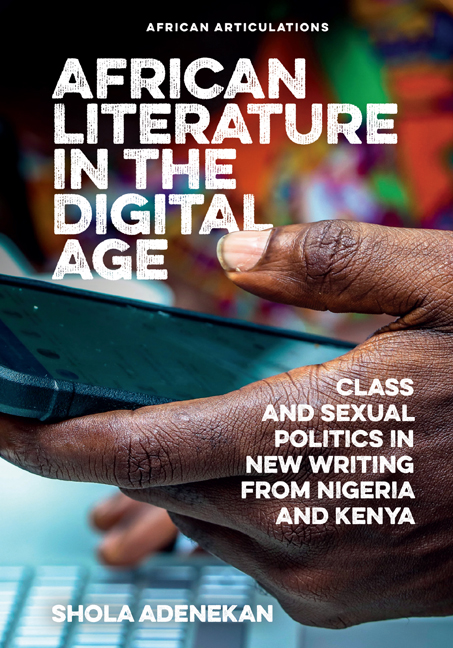 African Literature in the Digital Age
African Literature in the Digital Age Book contents
- Frontmatter
- Dedication
- Contents
- List of Illustrations
- Acknowledgements
- List of Abbreviations
- Introduction: Kenyan and Nigerian Writers in the Digital Age
- 1 Network Thinking: Literary Networks in the Digital Age
- 2 Class and Poetry in the Digital Age
- 3 Class Consciousness in Online Fictions
- 4 Digital Queer: The Queering of African Literature
- 5 Middle-Class, Transnational, Queer, and African
- 6 ‘Ashewo no be job’: The Figure of the Modern Girl in the Digital Age
- 7 The Erotic in New Writing from Nigeria
- 8 Social Media and the Aesthetics of the Quotidian
- Conclusion: Connecting the Dots
- Bibliography
- Index
- Miscellaneous Endmatter
Introduction: Kenyan and Nigerian Writers in the Digital Age
- Frontmatter
- Dedication
- Contents
- List of Illustrations
- Acknowledgements
- List of Abbreviations
- Introduction: Kenyan and Nigerian Writers in the Digital Age
- 1 Network Thinking: Literary Networks in the Digital Age
- 2 Class and Poetry in the Digital Age
- 3 Class Consciousness in Online Fictions
- 4 Digital Queer: The Queering of African Literature
- 5 Middle-Class, Transnational, Queer, and African
- 6 ‘Ashewo no be job’: The Figure of the Modern Girl in the Digital Age
- 7 The Erotic in New Writing from Nigeria
- 8 Social Media and the Aesthetics of the Quotidian
- Conclusion: Connecting the Dots
- Bibliography
- Index
- Miscellaneous Endmatter
Summary
On her Instagram page, on 28 March 2019, the Nigerian writer Chimamanda Ngozi Adichie is filmed dancing in front of a portrait of Andy Warhol. Adichie remarks on the video: ‘And just because one was not blessed with the gift of rhythm does not mean that one should not, from time to time, make futile but enthusiastic attempts …’
While Adichie's dance steps may not constitute a literary work –just as Warhol's many self-photographs are not pure art, traditionally understood –the video becomes a prop that fashions the writer as both a literary icon and an icon of popular culture. It opens up the writer's personal space to the readers of her creative writings as well as to her social media followers, many of whom look up to her as an inspirational figure. At the time of writing this book, this short clip had garnered over one hundred thousand views and almost a thousand comments from Adichie's nearly four hundred thousand followers on Instagram. A week later, Adichie was involved in yet another poignant moment as a pop icon, when she graced the front cover of Vogue Brazil, becoming one of the few women of African descent to have ever been selected to feature there. As the Coronavirus pandemic sent much of the world into quarantine in April 2020, Adichie (5 April 2020) gave her readers and followers a view of how this torturous period in human history personally affected her:
Last week, my family suffered a devastating tragedy, the very sudden death of my closest aunt, from a brain aneurysm. One day she was well and happy and the next day she was gone. Our time is filled with pain whose cause still does not feel fully true. We cry and yet we feel as though she is not really gone.
And it is more surreal to grieve a sudden death in these strange times when the world has shut down, places once full are empty, heavy with the ghosts of silent gatherings, and across the world people are dying alone. Coronavirus is a menace in the air, a menace inside our heads. Every day I am reminded of how fragile, how breakable we are.
My husband is a doctor and each morning when he leaves for work, I worry. My daughter coughs and I worry. My throat itches and I worry.
- Type
- Chapter
- Information
- African Literature in the Digital AgeClass and Sexual Politics in New Writing from Nigeria and Kenya, pp. 1 - 20Publisher: Boydell & BrewerPrint publication year: 2021
